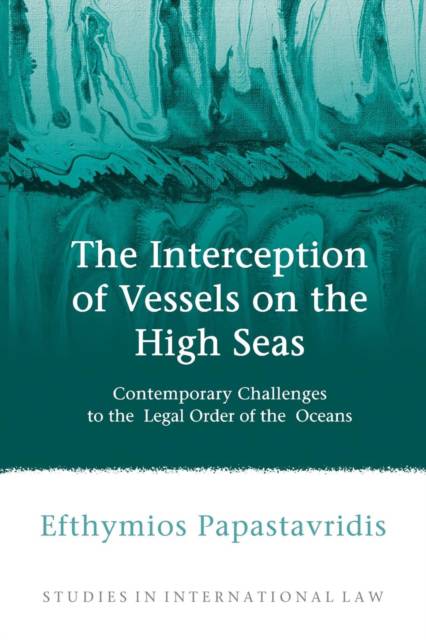
- Retrait gratuit dans votre magasin Club
- 7.000.000 titres dans notre catalogue
- Payer en toute sécurité
- Toujours un magasin près de chez vous
- Retrait gratuit dans votre magasin Club
- 7.000.0000 titres dans notre catalogue
- Payer en toute sécurité
- Toujours un magasin près de chez vous
The Interception of Vessels on the High Seas
Contemporary Challenges to the Legal Order of the Oceans
Efthymios Papastavridis
93,45 €
+ 186 points
Format
Description
The principal aim of this book is to address the international legal questions arising from the 'right of visit on the high seas' in the twenty-first century. This right is considered the most significant exception to the fundamental principle of the freedom of the high seas (the freedom, in peacetime, to remain free of interference by ships of another flag). It is this freedom that has been challenged by a recent significant increase in interceptions to counter the threats of international terrorism and WMD proliferation, or to suppress transnational organised crime at sea, particularly the trafficking of narcotics and smuggling of migrants. The author questions whether the principle of non-interference has been so significantly curtailed as to have lost its relevance in the contemporary legal order of the oceans. The book begins with an historical and theoretical examination of the framework underlying interception. This historical survey informs the remainder of the work, which then looks at the legal framework of the right of visit, contemporary challenges to the traditional right, interference on the high seas for the maintenance of international peace and security, interferences to maintain the 'bon usage' of the oceans (navigation and fishing), piracy jure gentium and current counter-piracy operations off the coast of Somalia, the problems posed by illegal, unregulated and unreported fishing, interdiction operations to counter drug and people trafficking, and recent interception operations in the Mediterranean Sea organised by FRONTEX.
Spécifications
Parties prenantes
- Auteur(s) :
- Editeur:
Contenu
- Nombre de pages :
- 404
- Langue:
- Anglais
- Collection :
- Tome:
- n° 43
Caractéristiques
- EAN:
- 9781849466646
- Date de parution :
- 28-08-14
- Format:
- Livre broché
- Format numérique:
- Trade paperback (VS)
- Dimensions :
- 155 mm x 231 mm
- Poids :
- 639 g

Les avis
Nous publions uniquement les avis qui respectent les conditions requises. Consultez nos conditions pour les avis.






